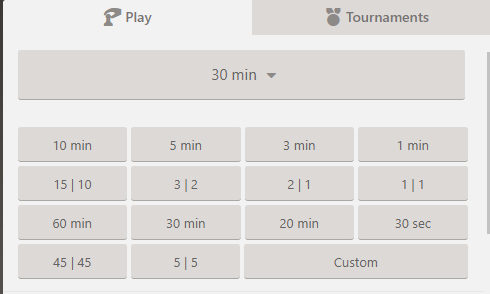In chess, the time possibilities of playing can range between 1 minute games and up to 24 hours per move. The most popular options are usually between 1 minute (blitz) and 30 minute games.
Having a shorter amount of time can influence a player’s style of playing and the approach towards the mid game and end game. In the case of blitz games, for example, the time limit doesn’t allow the players to analyse more than 2-3 moves ahead and limits the possibility of strategizing. The consequences of evaluating two moves instead of five are less severe, but the consequences of being faced with an unexpected move or series of moves could cost the game. The players are forced to focus more on their intuition and experience. It is important to be able to see all the possibilities, relationships between the pieces (who is protecting who and other vulnerable positions) and available combinations of attacking and/or defending across all the board. When playing less than 5 minute games, the players are relying more on experience and pattern recognition from other previous games or tactics. Often, this type of short games are played in a more aggressive style with a shorter-term vision and planning.
On the other side, there are the 15+ minute games which allow the players more time to think about their next moves and mistakes are easier to punish. Opening moves typically require less thought than complex middle game positions. In this case, when the opening part is over and you have reached the middle part of the game, the players must use their time to make sure they don’t fall for silly tricks, and to map out a logical plan. Once they have that plan, other moves will come fast and natural.
Anticipation is an important notion in classical chess. Predicting your opponent moves and understanding the patterns of thinking is an indispensable part of calculation. The real purpose of calculation in classical chess is to ensure the accuracy of your own moves and not to read your opponent’s mind at every turn. If your opponent makes an unexpected move, you can take a few seconds to recover.
Players need to focus on efficiently spending their time, especially the opponents time. Use the time that the opponent is spending to think about his next move to analyse more in depth the decisions, plan ahead and come up with a strategy.
A person may be a very good chess player but lose a lot of games because of getting short on time and making blunders as a result. The players need to realise when it is important to spend more time on a critical decision.



